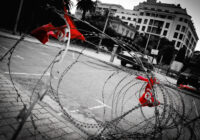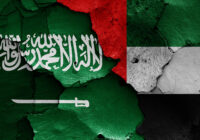Imagining viable “frameworks” for politics in the Middle East today requires a lot of creativity.
Although the Islamic State (IS) is no longer a direct military threat and has lost control over any significant territory, the Syrian War is far from over. In late January, Turkey attacked Kurdish forces within Syria, in the region of Afrin. The Syrian Democratic Forces (SDF), whom the US has been supporting, has entered into the fray, which could seriously complicate US relations with Turkey and add to the reigning confusion.
Here is what SDF spokesman Kino Gabriel had to say in a televised appeal to the Turks to halt their attack: “We are in the framework of looking at the possibility of sending more military forces to Afrin.”
This appears to be an original use of the word framework, which merits today’s 3D definition:
Framework:
A formal context or theoretical construct of thought whose solidity is presumed to be founded on strict laws of logic, but is typically used as a euphemism for the disposition to do something radically risky and offensive despite the probable disastrous consequences
Contextual note
Afrin is the region in northwest Syria where the Turkish military has begun bombarding positions of the YPG, a Syrian Kurdish militia, whom it accuses of terrorism. The YPG has been a significant force in the US-backed alliance of local fighters making up the loose coalition that calls itself Syrian Democratic Forces, a name chosen to please the US because it sounds as if it is dedicated to bringing democracy to replace an authoritarian regime.
Al Jazeera describes the SDF as “a multi-ethnic but predominantly Kurdish alliance of armed groups in Syria, and was a critical part in the fight against the Islamic State of Iraq and the Levant (ISIL, also known as ISIS) group.”
The US can’t afford to intervene or back an intervention of resistance to the Turks, for fear of compromising its relations with Turkey. Pentagon spokesperson Adrian Rankine-Galloway made this clear: “We are aware the SDF has repositioned some forces in response to recent tensions, however this was not under coalition direction … these movements of forces are not conducted under the direction or with the support of the coalition.”
But the Turks may interpret any active resistance of the SDF as involving the US. In other words, things are getting complicated, especially as Russia has responded in what appears to be the role of a peacemaker while paradoxically clearing the path for Turkey’s initiative. In other words, the US claims it is not supporting the SDF — while supporting it — and Russia claims it is neutral, while making things easier for Turkey.
Historical note
Since 2011, Syria has been the focus of everything that is wrong with whatever is left of the “new world order” announced by President George H.W. Bush in 1991. More than even Egypt and Libya, tragically gutted of both their substance and their hope by the forces that insisted on imposing their will, Syria is the ongoing battleground of unthinking but powerfully motivated and totally incompatible interests from within and, even more so, from without. Permanent war, mass migration, grandstanding about the rule of law and the necessity of regime change, devastation of entire cities and regions — this is the result of decisions by those who claimed to understand the “logic” of the new world order.
 Then there’s the Kurds, left out of the reckoning whereby, a century ago, the borders of nations were drawn essentially by the British and French to make the Middle East more amenable to their interests. Turkey and the Kurds.
Then there’s the Kurds, left out of the reckoning whereby, a century ago, the borders of nations were drawn essentially by the British and French to make the Middle East more amenable to their interests. Turkey and the Kurds.
Or again, Turkey as a potential member of Europe. Feasible or not feasible? Desirable or not desirable? Source of stability or of further conflict?
Imagining viable “frameworks” for politics in the Middle East today requires a lot of creativity — or simply a requisite amount of psychedelic drugs! The frameworks that are cited are closer to hallucinations than intelligently engineered solutions.
And the interminable conflicts continue. Today is Groundhog Day, after all.
*[In the age of Oscar Wilde and Mark Twain, another American wit, the journalist Ambrose Bierce, produced a series of satirical definitions of commonly used terms, throwing light on their hidden meanings in real discourse. Bierce eventually collected and published them as a book, The Devil’s Dictionary, in 1911. We have shamelessly appropriated his title in the interest of continuing his wholesome pedagogical effort to enlighten generations of readers of the news.]
The views expressed in this article are the author’s own and do not necessarily reflect Fair Observer’s editorial policy.
Photo Credit: kirill_makarov / Shutterstock.com
Support Fair Observer
We rely on your support for our independence, diversity and quality.
For more than 10 years, Fair Observer has been free, fair and independent. No billionaire owns us, no advertisers control us. We are a reader-supported nonprofit. Unlike many other publications, we keep our content free for readers regardless of where they live or whether they can afford to pay. We have no paywalls and no ads.
In the post-truth era of fake news, echo chambers and filter bubbles, we publish a plurality of perspectives from around the world. Anyone can publish with us, but everyone goes through a rigorous editorial process. So, you get fact-checked, well-reasoned content instead of noise.
We publish 2,500+ voices from 90+ countries. We also conduct education and training programs
on subjects ranging from digital media and journalism to writing and critical thinking. This
doesn’t come cheap. Servers, editors, trainers and web developers cost
money.
Please consider supporting us on a regular basis as a recurring donor or a
sustaining member.
Will you support FO’s journalism?
We rely on your support for our independence, diversity and quality.






